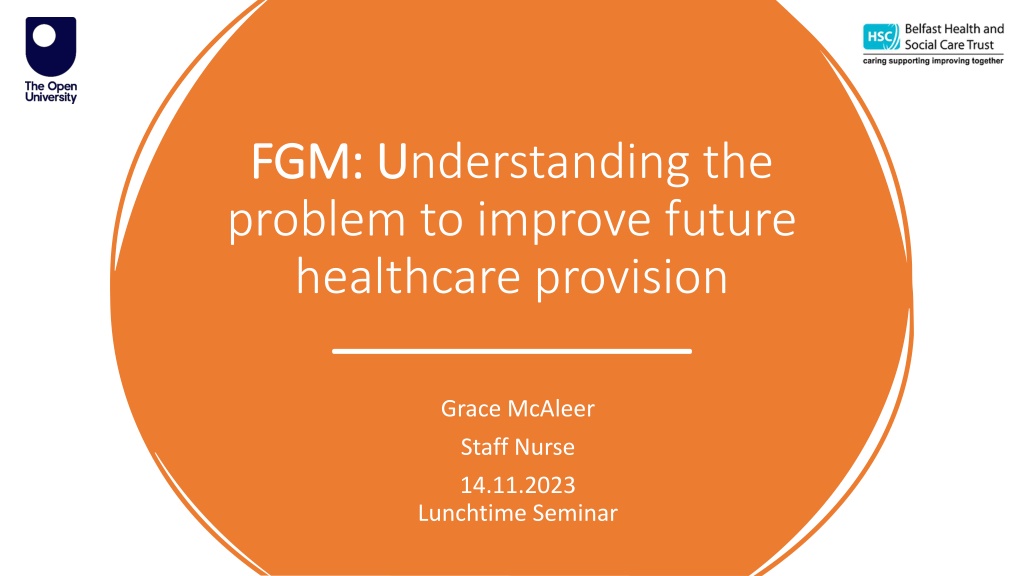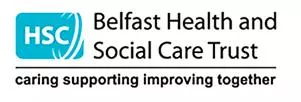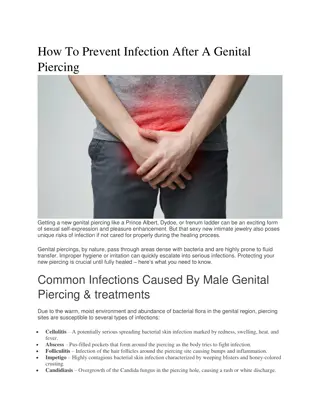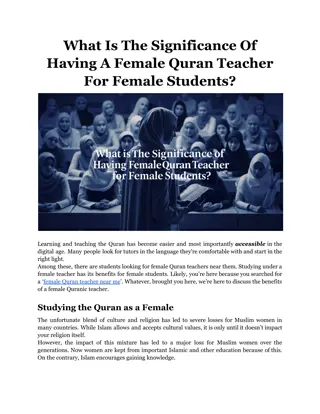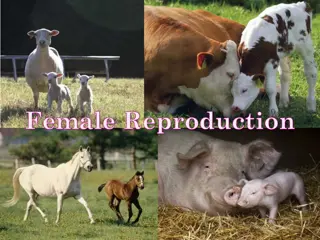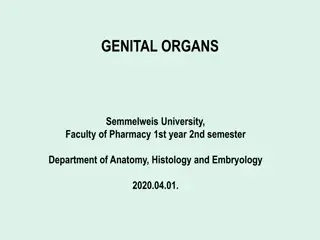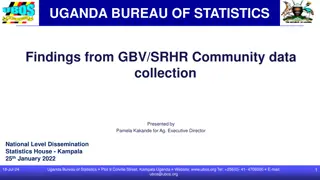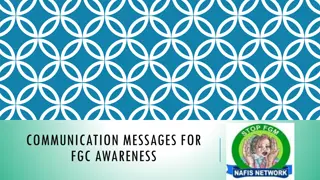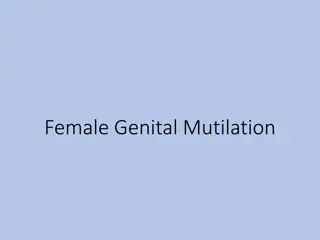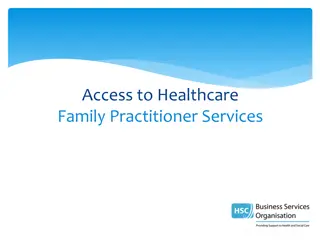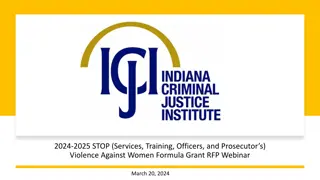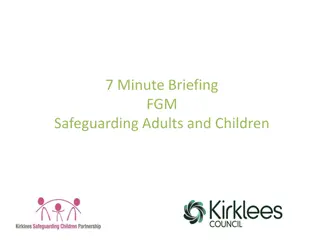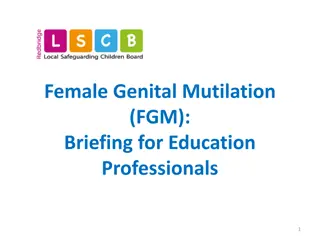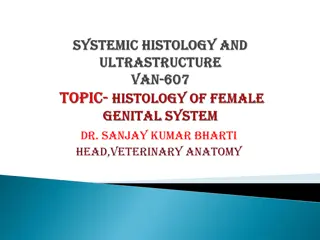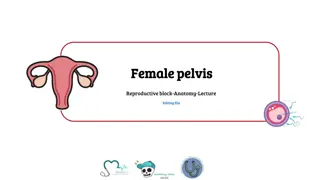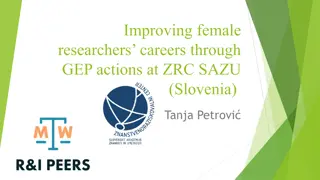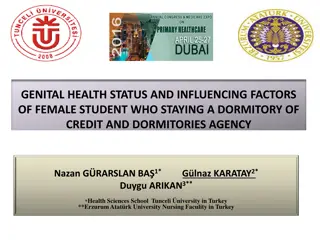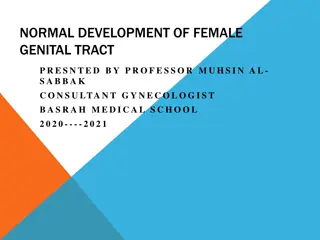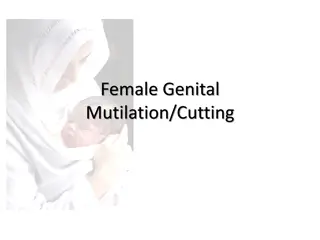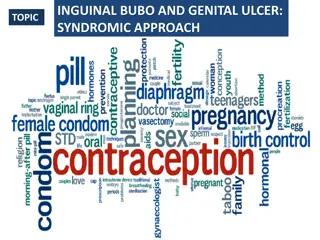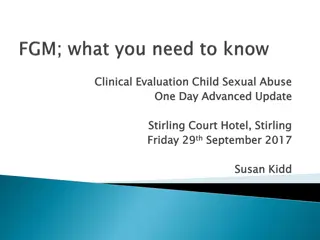Understanding Female Genital Mutilation: Improving Healthcare Provision
Delve into the complexities of Female Genital Mutilation (FGM), exploring its global, UK, and Northern Ireland contexts. Understand the health implications, cultural motivations, and legal frameworks surrounding FGM. Discover the vital need for improved healthcare services to support affected populations and combat this violation of human rights.
Download Presentation

Please find below an Image/Link to download the presentation.
The content on the website is provided AS IS for your information and personal use only. It may not be sold, licensed, or shared on other websites without obtaining consent from the author. Download presentation by click this link. If you encounter any issues during the download, it is possible that the publisher has removed the file from their server.
E N D
Presentation Transcript
FGM: U FGM: Understanding the problem to improve future healthcare provision Grace McAleer Staff Nurse 14.11.2023 Lunchtime Seminar
Understanding the problem - What is FGM? - Why it is important to know about: health implications and why it happens. - The Global, UK, and NI context Overview of Presentation - Challenges impacting understanding of the problem - Identifying the gaps Improving healthcare for the future - What is available outside NI - Now what for future provision
The World Health Organisation defines Female Genital Mutilation as, "All procedures which involve the partial or total removal of the external genitalia or injury to the female genital organs whether for cultural or any other non-medical reasons." (WHO, 2023) What is FGM?
Health implications of FGM Health implications of FGM
Maintain virginity/ control females sexuality Traditional rite of passage- 'becoming a woman' Family honour Social norms/ to be accepted as part of the community Why is FGM practised? Marriage Increased pleasure for husband Beauty/ Cleanliness (National FGM Centre, 2023)
However, There are no health benefits. Reflects deep-rooted inequality and constitutes an extreme form of discrimination against girls and women (WHO, 2023) A violation of Human Rights (WHO, 2023) Illegal in UK since 1985 - Prohibition of Female Circumcision Act (1985) - replaced in England, Wales and Northern Ireland by the Female Genital Mutilation Act (2003) which include FGMPOs. - Serious Crime Act (2015). It is illegal in ROI (own legislative laws in place) Even with legislation in place - awareness raising, prevention, and specific person- centred, personalised, healthcare provision is important to promote health and prevent ill-health in this population.
IMPACT More than 200 million girls More than 200 million girls and women alive today and women alive today have been subject to have been subject to FGM FGM (WHO, 2023) In the UK, it is estimated that: around 137,000 women have undergone FGM some 60,000 girls under 15 years old are at risk (GOV.UK, 2021) "Every 11 seconds a girl is being cut. Why are we not outraged?" Dr Leyla Hussein (The Cruel Cut, 2023)
Census Northern Ireland Statistical Bulletin (2021) highlights that: Northern Ireland Context The fastest growing group of people is Other National Identities from outside UK and Ireland. This group is up from 61,900 people in 2011 (3.4% of the population) to 113,400 people in 2021 (6.0% of the population). Despite diversity growth, it is difficult to find verified healthcare prevalence data for knowing and understanding the extent of people living with FGM in NI and their corresponding healthcare needs. FGM remains a relatively hidden problem due to cultural sensitivities and legal implications. I have reached out to PHA / Safeguarding /Midwifery / University Academics - for information and discussion.
Identifying the Gaps: Identifying the Gaps: NI Scoping Study NI Scoping Study (Mackle et al, 2018) 3yearly Mandatory training in place for midwives From what I can ascertain: Commissioned by the African and Caribbean Support Organisation Northern Ireland (ACSONI). Highlighted similar issues to what I have experienced in obtaining information. Specific FGM awareness training available in Midwifery curriculum and touched upon but could be built upon in Pre-reg Nursing curriculum. Specific FGM training available but not mandatory for Nurses to attend. Key Recommendations for Action Specific FGM and culturally sensitive training in the healthcare sector is needed. Gap in Service Provision to be addressed for those impacted by FGM. Strategic direction required. There does not appear to be structured service provision in place for FGM health care needs in non-pregnancy situations. Some service provision in place in maternity care.
Improving NI healthcare for the future
What is available outside NI - NHS Pilot scheme of 8 FGM support clinics (NHS England 2021) Services for BOTH pregnant and non-pregnant women The clinic staffs: midwives, nurses, health advocates (Arabic and Somali) and specialist counselling support. Support Educated on their bodies (husbands/partners welcome) Educated on laws around FGM Assessed and FGM type identified Offers a deinfibulation service - a procedure to reopen the scar tissue, aiding menstruation and urination. They are all offered the counselling services Referral to pain management specialist services Now what for future health care provision? Similar clinics in Dublin x2
Collaboration Likeminded people. Develop FGM support clinic Access to NI Statistics Patients who are already in our system receiving treatment for FGM complications. Community engagement Consideration for NI integrated health and social care involving other health professionals in a service. Where to now for Northern Ireland
References Census (2022). Main statistics for Northern Ireland Statistical bulletin - National identity. [online] Available at: https://www.nisra.gov.uk/system/files/statistics/census-2021-main-statistics-for-northern-ireland-phase-1-statistical-bulletin-national-identity.pdf. GOV.UK (2015). Serious Crime Act 2015. [online] Legislation.gov.uk. Available at: https://www.legislation.gov.uk/ukpga/2015/9/part/5/crossheading/female-genital-mutilation/enacted?view=interweave [Accessed 17 Apr. 2023]. GOV.UK (2019). Female Genital Mutilation Act 2003. [online] Legislation.gov.uk. Available at: https://www.legislation.gov.uk/ukpga/2003/31/contents. Mackle, D., Bloomer, F. K., Pierson, C., & MacNamara, N. (2018). FGM Scoping Study Northern Ireland. [online] Available at: https://www.eani.org.uk/sites/default/files/2018-10/Female%20Genital%20Mutilation%20-%20%20Scoping%20Study%20smaller.pdf. National FGM Centre (2019). Understanding your role in safeguarding girls, engaging parents and teach- ing about FGM Female Genital Mutilation: Guidance for schools. [online] Available at: http://nationalfgmcentre.org.uk/wp-content/uploads/2019/06/FGM-Schools-Guidance-National-FGM- Centre.pdf. National FGM Centre (2022). FGM National FGM Centre. [online] nationalfgmcentre.org.uk. Available at: http://nationalfgmcentre.org.uk/fgm/. Nursing and Midwifery Council (2018). Future nurse: Standards of Proficiency for Registered Nurses. [online] Nursing and Midwifery Council. Available at: https://www.nmc.org.uk/globalassets/sitedocuments/education-standards/future-nurse-proficiencies.pdf. Public Health England (2021). Female genital mutilation (FGM): migrant health guide. [online] GOV.UK. Available at: https://www.gov.uk/guidance/female-genital-mutilation-fgm-migrant-health-guide. The Cruel Cut (2023). The Cruel Cut. [online] Oslo Freedom Forum. Available at: https://oslofreedomforum.com/talks/the-cruel-cut/ [Accessed 17 Apr. 2023]. World Health Organization (2023). Female genital mutilation. [online] Who.int. Available at: https://www.who.int/news-room/fact-sheets/detail/female- genital-mutilation. NHS England (2021) Economic Analysis of NHS FGM support Clinics- Final report
Contact Details grace.mcaleer@belfasttrust.hscni.net grace_mcaleer@hotmail.co.uk Twitter/X: gracemcaleer1
